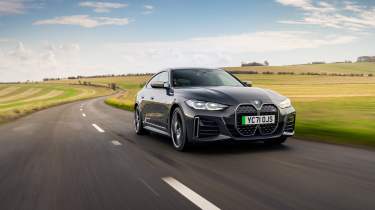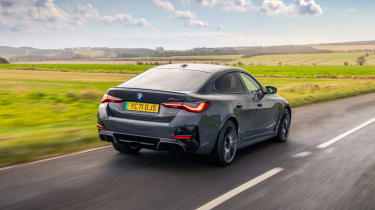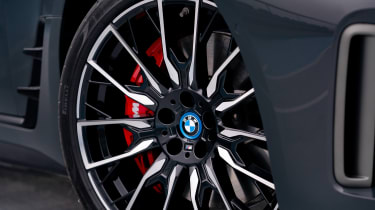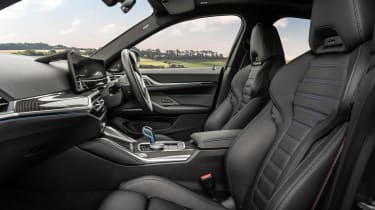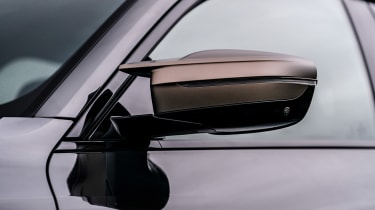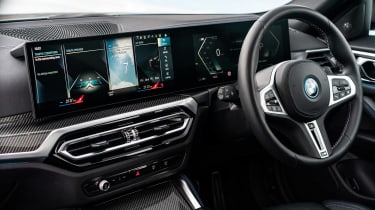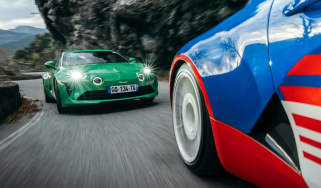BMW i4 M50 2023 review – a glimpse into the future of M cars
Lots of BMW M’s magic has found its way into a convincing package that’s let down by the usual EV compromises
Way back in 2010, BMW charged (yes, it’s a pun I wanted to get out of the way early doors) its Mini brand with developing a line-up of electric-powered cars to hand out to customers so that the company could gather data on how such vehicles are – and would be – used. As a result, BMW’s ‘Project i’ plan was born and led to the marvellously innovative and fit for purpose i3 city car and i8 hybrid sports car.
Naturally, being marvellously innovative and fit for the needs of the car-buying public, no one bought them. Not in serious enough numbers, at least, so both are consigned to the history books alongside Audi’s A2 and Honda’s NSX under the heading ‘Cars consumers didn’t get until they were collectable’.
But BMW wasn’t deterred by the sales performance of its first i cars and has continued to work away in Munich, designing and developing a wider range of battery electric vehicles that includes its iX models – a family of SUVs that make the M3/4’s front end look tame – and this, the i4, here tested in flagship £71,085 M50 form.
Unlike the new electric iX family, the i4 isn’t built on its own platform, rather it takes the current 3-series/4-series Gran Coupe underpinnings (CLAR to those who get excited by platform names) and adapts them accordingly, including increasing the wheelbase’s length by 5mm. The internal combustion engines are ditched and in their place goes a pair of motors, one for each axle. Between these sits a battery pack that’s bolted to the floor to increase stiffness and which lowers the centre of gravity by 34mm in the process – although the 80.7kWh battery does add 550kg to the car’s kerb weight, bringing the total to 2215kg. Which is quite frankly obscene for a car of this size.
More reviews
It means that despite producing 536bhp and 586lb ft of torque, albeit only when the Sport Boost driving mode is selected and only for ten seconds at a time, the i4 M50 is almost half a second slower to 62mph than an M3 Competition xDrive (though still recording a pretty spritely 3.9sec) and tops out at 139mph. Of more relevance is the car’s power-to-weight ratio, which at 249bhp/ton is on a par with an F56 Mini John Cooper Works GP. The M3 xDrive generates 287bhp/ton.
Put away the stopwatches and the i40 M50 has more than enough performance to keep you out of trouble (or in it). Off the line it has the electric-car party trick to call upon, with instant torque from those motors spinning at 17,000rpm giving the rear tyres something to think about and the fronts a workout with a slight scrabble of torque steer. But as with all EVs that instant thump soon drifts away, the rate of acceleration tailing off as the car’s mass and aerodynamic drag take hold like a parental hand pulling back on the reins of an excited toddler.
There’s a relaxed calmness in the way it picks up momentum on regular roads, and when there is an opportunity to dive into the 'M' elements of BMW’s electric 4-series there’s plenty of adjustability via the throttle to make you feel you’re part of the progress rather than a simple carrier of instructions. As with Porsche’s impressive Taycan, the M50 feels like a car that’s been engineered way beyond being an electronic device to move people from A to B.
It’s a sensation that flows through the rest of the i4. There’s good, linear weight to the steering that allows you to position the car cleanly into a corner, with little of the running-over-glass sensation that the majority of EVs, admittedly SUV-based examples, display. And if you need to make an adjustment on the way in, through, or out of the turn, you’re not left in no man’s land trying to figure out which way everything is pointing. Pitch the M50 into a corner and the front axle finds plenty of grip, with the rear mobile and agile enough to telegraph back the information required for you to make your next move. It’s a very fluid and instinctive car in this respect, with supreme clarity to the steering thanks in part to the i4's extra bracing across what would normally be the engine bay.
Underpinning the i4 is the 3 series’ double-wishbone front suspension with an aluminium brace between the turrets tying them together, but at the rear a pair of air springs have been installed. Adaptive damping is standard and the front and rear tracks are wider than those of the 3-series, by 26mm and 13 mm front and rear, respectively.
It makes for a car that strikes a fine balance between a supple ride and strong body control, a combination the current crop of BMW M and M Performance models are benefiting from, too. The standard wheels are 18-inch items, 19s are a no-cost option and the 20s fitted to our test car didn’t shatter the ride as you’d expect. Overall, it’s not as sharp or precise as an M340i or M3, but you’re a long way from feeling short-changed.
Naturally there aren’t any sonorous BMW straight-six notes to enjoy. Instead, the firm’s collaboration with Hans Zimmer has resulted in an interesting soundtrack rather than an engaging one. After a while, the synthesised movie-esque whooshes sound a little overdone and try-hard. I think I’d rather enjoy the silence.
Current 4-series Gran Coupe drivers will recognise the majority of the i4’s interior. There are two screens – 12.3in for the instrument display and 14.9 for the central display – but because the i4 is based on a platform designed for an internal combustion engine there’s still a transmission tunnel and a traditional gearlever. The controller for the iDrive 8.0 is also housed in the same place you’ll find it in any ICE BMW, providing familiarity for those transitioning from one energy source to another.
Drive modes are also activated as they are in any regular BMW, the three on offer here being Eco Pro, Comfort and Sport, with Sport Boost requiring a dive into the submenus from the main screen.
As a result of all of the above, the i4 feels no different inside from a petrol- or diesel-engined equivalent, which is a good thing – aside from the instrument display, which remains a bit of a mess and the only element of the interior that’s different for the sake of being so. But it’s a minor blot. When you’re not enjoying the M50’s fully charged performance, it rides with a suppleness that makes the impressive crop of current BMWs feel a little sharp-edged, the i4 offering a GT-esque experience for a fraction of the cost of most modern-day GTs.
Which in a roundabout way brings us to range. Officially, the M50 can achieve 318 miles from a charge, and while we had the car in February (high single-figure ambient temperatures), we saw no more than 230 miles, which soon dropped by 30 miles within the first ten miles covered before settling to a consistent mile-for-mile exchange. Up your pace and the drop-off in range isn’t as rapid as you’re possibly expecting, but if you’re new to EVs your right foot soon releases its pressure as the range gets close to 100 miles and your mind starts planning your next charging opportunity.
EVs and evo continue to be an arm’s length relationship, especially so when the market is focused on quick-fix SUV-style propositions that feel unresolved, underdeveloped and frighteningly overpriced for what they are.
Yet while we’re some way off (perhaps we’ll never quite get there) from an EV that can be a genuine like-for-like replacement for a petrol-engined driver’s car, models such as Tesla’s Model 3 Performance, Porsche’s Taycan and now the i4 M50 feel a very evo way of making the step to a daily electric car more manageable for those for whom a car is more than a simple transportation device. We’d still want an M3 tucked away for playdays and holidays, mind.
Price and rivals
Now here’s a tricky one as the EV market for premium, luxury sport saloons is still in its infancy while the SUV blunderbusses are rolled out. However, there is a trio to distract you from the BMW i4 M50, starting with the new-ish kid on the block in the shape of the facelifted Polestar 2. At £57,950 it’s considerably cheaper than the BMW, and its long range dual motor powertrain develops a healthy 469bhp with a claimed range of 352 miles.
Next up is the ubiquitous Tesla Model 3 Performance, which has also seen a mid-cycle refresh. Pricing for the updated Model 3 hasn't been released yet, but expect it to sit near the £60,000 mark with a 340-mile range and a 3.1sec 0-60mph time. Or you can stretch yourself to an entry-level Porsche Taycan, although your £79,200 only gets you a rear-drive model with 408bhp, a 5.4-second 0-62mph time and a 143mph top speed, with a claimed 276-mile range.

